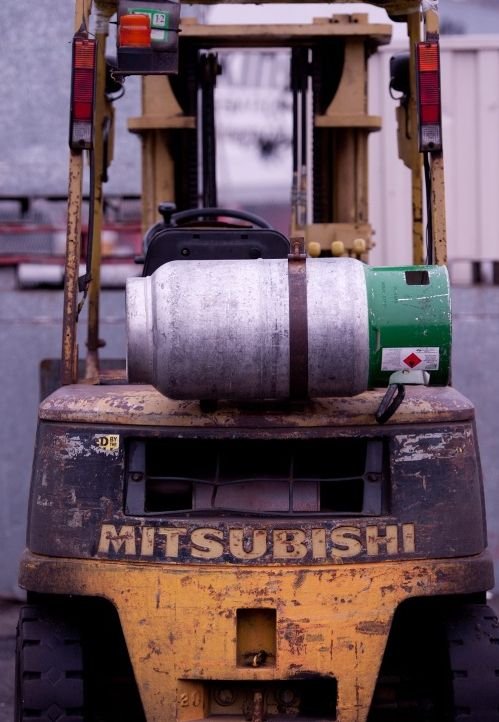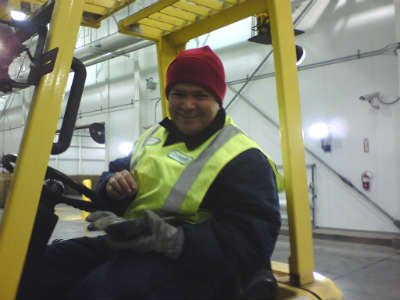 If you are using a propane-powered forklift in your business operation, it is most likely you are also maintaining quite a few forklift propane tanks. You might be asking now how long forklift propane tanks are good for.
If you are using a propane-powered forklift in your business operation, it is most likely you are also maintaining quite a few forklift propane tanks. You might be asking now how long forklift propane tanks are good for.
Ordinary brand new tanks with a capacity of 100 lbs or less expire within 10-12 years from the date of manufacture, depending on the condition. The date of manufacture can be found in the collar of the tank. If you decide to keep the tank because it is still in good condition, you need to recertify it after that period for you to be able to use it for another 5 years.
If you are renting propane tanks and you’ve noticed that it is due for requalification or recertification, contact the dealer, tell them about it. Don’t use the tank, inform the dealer for urgent replacement so that you can use the forklift right away. Omitting the recertification is common, so it is a good practice to visually check the collar of the tank for verification.
If your business utilizes quite a number of propane forklifts, it is ideal to give focus on the safe handling of propane tanks. You can incorporate specific topics on safe handling in your forklift operator training program. If you don’t have a training program yet, you can contact this provider to give you better advice.
Don’t Get Confused, Read the Collar Correctly
The simplest way of knowing the tank’s history and other information is by inspecting the collar or handle of the tank. Different information is stamped on it and many people are confused about reading the collar correctly.
- Tare Weight (TW) – it is the weight of the tank without its content. This helps the user determine how much propane is still in the tank left available for use. It is measured in pounds (lbs).
- Water Capacity (WC) – this number is the maximum amount of propane that the tank can contain. It is also measured in pounds (lbs). It is a good practice to check the WC when refilling.
- Date of Manufacture – It is the marking in a month-year format. You may see 01-18 for January 2018 or 06-20 for June 2020.
- Date of Last Recertification – represents by A, B, C, D marking followed by the year. (A is the first quarter, B is the second quarter, C is the third quarter, D is the fourth quarter).
- Unique Number – If the car has a chassis number, the propane tank has it as well. This number helps the DOT and dealers to keep track of the tanks in circulation.
Take These Good Practices When Handling Forklift Propane Tanks
 Forklift propane tanks must be inspected regularly. It is a good idea to inspect it daily. The hose must be checked for a minute drip, the valve must be tested for the minute gas leak, and the condition of the tank must be monitored. Never judge the condition of the tank by its appearance. The tank can be repainted and be looked new again. It is always to consult the collar to track its history.
Forklift propane tanks must be inspected regularly. It is a good idea to inspect it daily. The hose must be checked for a minute drip, the valve must be tested for the minute gas leak, and the condition of the tank must be monitored. Never judge the condition of the tank by its appearance. The tank can be repainted and be looked new again. It is always to consult the collar to track its history.- If any defects are found, don’t use the tank, set aside it and put a “defective” label on it. This way, other operators can be warned. If the tank is rental, immediately inform the dealer for replacement. If the tank is owned, it is advised to buy a brand new one as a replacement. During visual inspection, if you found defects, it is best advised to replace the tank immediately. Defective tanks should not be refilled and used.
- There should be a designated area where operators can replace forklift propane tanks. The area should be well ventilated so that accumulation of gas can be avoided. The area should also have sufficient lighting.
- Place an eyewash station in the facility so that when propane comes into contact with the eyes or skin, it can immediately wash away preventing severe injury to the worker. To know more about eyewash stations, read here.
- Never overfill the tank, propane inside is in high pressure, when overfilled, the tank can rupture that could cause explosion and injury to the operator. See the collar to see the WC of the tank.
- Never smoke near the forklift, especially if the area is confined. Propane being a highly flammable gas, if accumulates in a room, can easily catch fire from a lit cigarette. If you smell rotten eggs or a bad odor, it is a tell-tale sign that there’s a propane leak. If this happens, immediately report it to your supervisor for gas detection.
- Proper personal protective equipment (PPE) must be worn when refilling or replacing forklift propane tanks to prevent propane from getting into contact with your skin or eyes.

